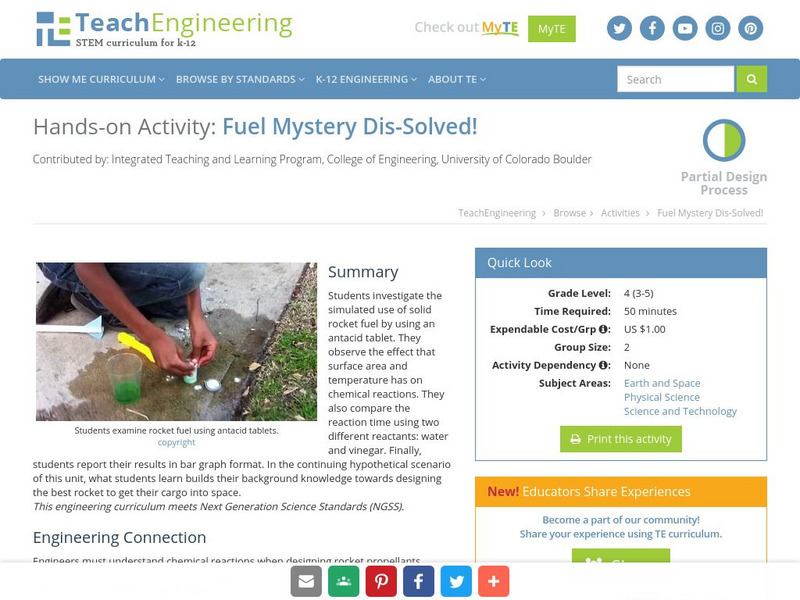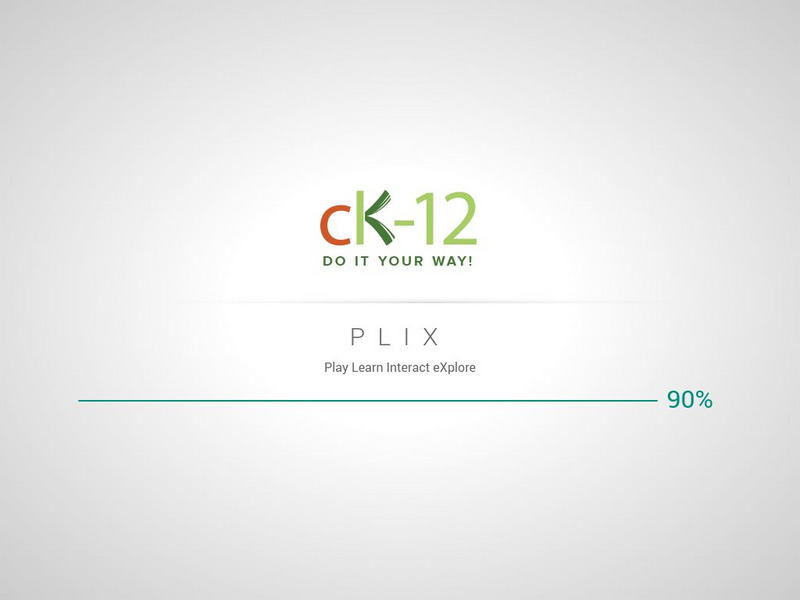Hi, what do you want to do?
Concord Consortium
Concord Consortium: Stem Resources: Making and Breaking Bonds
A look at the processes of association and dissociation in chemical bonding. Observe simulations that show the influence of temperature on making and breaking of bonds, how diatomic molecules form, and what determines the speed of...
TeachEngineering
Teach Engineering: Fuel Mystery Dis Solved!
In this activity, students investigate the simulated use of solid rocket fuel by using an antacid tablet. Students observe the effect that surface area and temperature has on chemical reactions. Also, students compare the reaction time...
State University of New York
State University of New York: Hess's Law
Because reactions can be considered "additive," a series of reactions can be written like simultaneous mathematical equations and a net reaction determined by addition. To use this simulation, select individual reactions from the three...
Science Buddies
Science Buddies: Explore Enzyme Activity With Toothpicks
In this activity, you will simulate an enzymatic reaction and explore what factors affect the activity of an enzyme.
Chemistry Collective
Chem Collective: Acclimatization on Mt. Everest
To get to the top of the mountain before winter arrives, students must derive an equation that relates the necessary amount of hemoglobin to the partial pressure of oxygen at the current and next camp.
Vision Learning
Visionlearning: Dalton's Playhouse
Travel back in history and visit the laboratories of Priestley, Lavoisier, and others. Take part in simulations of the experiments which laid the foundation for the scientific field of chemistry. Learn about the discoveries which lead to...
Georgia Department of Education
Ga Virtual Learning: Chemistry: Thermochemistry
Through informational text, interactive practice problems, online labs, and virtual simulations, students are introduced to the concepts of thermochemistry.
Georgia Department of Education
Ga Virtual Learning: Chemistry: Kinetics and Equilibrium
Through informational text, interactive practice problems, virtual simulations, and video clips, students learn about reaction rates and equilibrium.
Nobel Media AB
The Nobel Prize: Chirality Chemistry 2001
In 2001 the Nobel prize in chemistry was awarded for work with Chiral molecules. These molecules can be used to control the speed of chemical reactions. This brief game teaches the basic principles of chirality.
Concord Consortium
Concord Consortium: Stem Resources: Catalysts
Want to see how a catalysts help a reaction happen? In this science simulation, students can experience a reaction that has gone forward due to a catalyst.
Chemistry Collective
Chem Collective: Stoichiometry Applet
One of the first numerical problems encountered in introductory chemistry is that of "limiting reagents". This applet serves as a supplement to such calculations, providing imagery that helps students see beyond the rote mathematics.
CK-12 Foundation
Ck 12: Plix Series: Enthalpy
[Free Registration/Login Required] Move the chemical reaction along, and observe the overall change in enthalpy for each reaction in the simulation. After the activity, answer one challenge question to check for understanding.
TeachEngineering
Teach Engineering: Aqua Thrusters!
In this activity, students construct their own rocket-powered boat called an "aqua-thruster." These aqua-thrusters will be made from a film canister and will use carbon dioxide gas - produced from a chemical reaction between an antacid...
Concord Consortium
The Concord Consortium: Molecular Workbench: Explosions
Observe an explosion on a molecular level. Understand how explosions can do work.
Concord Consortium
The Concord Consortium: Molecular Workbench Glycogen Phosphorylase
Wath an animation that shows how enzymes break down glycogen into glucose subunits.



















